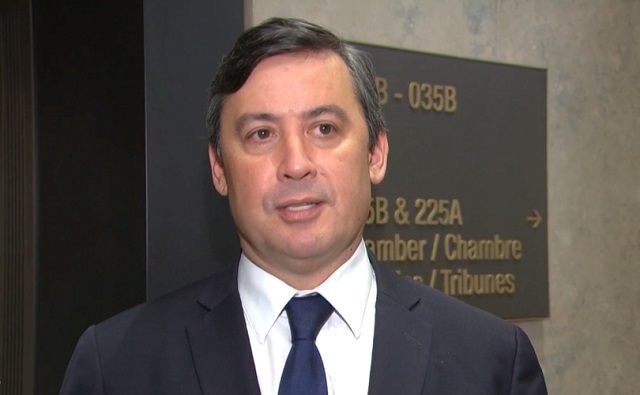Alberta
Update 8: Northwest Alberta wildfire (May 29 at 6 p.m.)

May 29, 2019
Wildfire battles continues as re-entry planning moves forward. To date, the province has provided more than $6 million in one-time, emergency support payments to evacuees.
Current situation
- Chuckegg Creek Wildfire is burning approximately three kilometres southwest of the Town of High Level in Mackenzie County.
- This out-of-control wildfire has grown to more than 150,000 hectares.
- Resources on the ground include about 390 wildland firefighters and staff, 28 helicopters and heavy equipment.
- Cabinet approved two orders in council to release funds to cover emergency response including structural firefighting efforts, evacuation costs, reception centre costs, and recovery costs as well as fire prevention, suppression, reclamation and reforestation costs.
- Parts of northern Alberta remain under a special air quality advisory.
- New mandatory evacuations have been issued for:
- La Crete Ferry Campground
- Steen River
- Hawk Hills
- Keg River
- Carcajou
- Residents living between Township Road 922 and north to Northern Lights County.
- Residents should check Alberta Emergency Alerts for details.
- Officials are preparing for residents to re-enter High Level once public safety has been confirmed.
- Visit emergency.alberta.ca for detailed and frequently updated information.
Financial supports
- You may qualify for the evacuation payment if you were:
- living, working or vacationing in the affected area
- forced to leave due to an evacuation order
- paid for most of your costs to evacuate
- Albertans who qualify will receive $1,250 for each adult and $500 for each dependent child.
- Applications are open:
- Apply online through the MyAlberta Evacuation Payment application using a smart phone, device or desktop. Interac e-transfers may take 24 hours to process.
- Apply in–person at any Alberta Supports Centre in Alberta.
- Evacuees in La Crete and Fort Vermillion can apply in person at La Crete Heritage Centre (25411 Township Road 1060, south of La Crete) or Fort Vermilion Community Cultural Complex (5001 44 Avenue)
- If you require assistance registering, call 310-4455
- If you’re having technical issues, contact My Alberta Digital ID at 1-844-643-2789 (Monday to Friday, 8:15 a.m. to 4:30 p.m.)
Reception and call centres
- Reception centres are open at:
- Slave Lake Legacy Centre (400 6 Avenue NE)
- High Prairie Gordon Buchanan Centre (5413 49 Street)
- Grande Prairie Regional College (10726 106 Avenue)
- Peace River Misery Mountain Ski Hill (10408 89 Street)
- La Crete Heritage Centre (25411 Township Road 1060, south of La Crete)
- Fort Vermilion Community Cultural Complex (5001 44 Avenue)
- Dene Wellness Centre (In K’atl’ Odeeche First Nation, 17 kilometres east of Hay River)
- Hours of operation for evacuation reception centres can be found at emergency.alberta.ca.
- 310-4455 call centre hours are extended until Friday from 8 a.m. to 9 p.m.
Highway closures
- Highway 35 is open between High Level and the Zama City turnoff. Travel is not permitted north of the Zama City turnoff.
- Highway 35 is closed between approximately five km south of High Level and five km north of Highway 695 (Keg River turnoff). Access to Keg River remains open.
- Highway 697 is closed between Highway 35 and Range Road 185, east of the La Crete Ferry.
- The La Crete Ferry is closed.
- Northbound travelers from the Peace River area should detour using Highway 986 to Highway 88.
- Highway 58 remains closed between High Level and approximately 90 km west, at the junction of Range Road 45A (south of Chateh).
- To stay informed on all road closure info visit 511.Alberta.ca or download the mobile app.
Insurance information
- Evacuated residents should retain all their receipts for food purchases, accommodation and other related expenses to provide to their insurer for possible reimbursement.
- Most home and tenant’s insurance policies provide reasonable coverage for living expenses during an evacuation. Contact your insurance company for details.
- Albertans who cannot remember or reach their insurance provider, can contact the Insurance Bureau of Canada at 1-844-227-5422 or by email at [email protected]. Information to understand your fire insurance coverage is online at ibc.ca/ab/disaster/alberta-wildfire.
Justice and legal matters
- Sittings scheduled for Wabasca Desmarais Court on Thursday, May 30 will be heard in High Prairie Court.
- High Level Court is closed. Call the Peace River Court at 780-624-6256 for inquiries on High Level Court matters scheduled for this week and next. All scheduled Fort Vermilion matters will be heard in Peace River. Call the Peace River Court at 780-624-6256 if you’re unable to register your name and phone number. Matters will be held by phone if necessary.
- In many cases, tickets can be paid online. For any other inquiries requiring direction from the court about Peace River and Fort Vermilion court matters, call the Peace River Court at 780-624-6256.
- If you have an appointment with a probation officer in an evacuated area, report to the community corrections office nearest you. If you do not know where the nearest one is, call 780-427-3109 (to call toll free, first dial 310-0000).
- If you are an intermittent server in an evacuated area, call the Peace River Correctional Centre at 780-624-5480 (to call toll-free, first dial 310-0000) for direction.
Education
- Grade 12 students in the High Level area are eligible for an exemption from their diploma exam. When a student is exempt from the diploma exam, their classroom mark will be their final mark.
- These students could also write the exam if they choose to do so and can safely make it to a school, either in their community or another. Students can also defer writing the diploma exams to August.
- For grades 6 and 9 provincial achievement tests, students can be excused from writing. Alternately, these students could write the tests if they can safely make it to a school, either in their community or another.
- Once students and their families have made a decision, they should contact their school division.
Air quality
- Much of northern Alberta is under a special air quality statement.
- Smoke from wildfires in northern Alberta is causing poor air quality and reducing visibility.
- Alberta Wildfire recommends checking FireSmoke.ca to find out where the smoke is coming from.
Boil water advisory
- Boil water advisories remain in place for Meander River (Dene Tha’ First Nation) and North Tall Cree (Little Red River Cree Nation). Although power has been restored, the boil water advisories will remain in place until water testing is complete.
Health
- Mental health support is available by calling Alberta’s 24-hour Mental Health Help Line at 1-877-303-2642.
- Alberta Health Services is providing supports to the receptions centres. These supports include addiction and mental health, indigenous health liaisons, nursing, emergency medical services, public health, home care and more.
Pets and livestock
- Animal Control are collecting household pets that have been left behind. Pets will be moved to a safe and secure location outside of the Town of High Level. Contact 780-926-2201.
- Mackenzie County has stock trailers to assist with livestock transport. Visit highlevel.ca for more information.
Donations and volunteers
- The towns of High Level and Slave Lake are not accepting material donations and do not require volunteers at this time.
- The Town of Slave Lake has set up an online form for offers slavelake.ca/FormCenter/Other-27/High-Level-Evacuation-Volunteer-Sign-Up-159.
- Check the Mackenzie County Facebook page for an up-to-date list of donations needed and drop-off locations.
Canada Post
- Canada Post has suspended mail delivery services in the communities of High Level, Paddle Prairie Metis Settlement, Meander River, Chateh and Keg River.
- Mail will be held at the Edmonton depot until mail service resumes.
- Check the Canada Post website for updates.
Income Support, Alberta Supports and AISH
- Residents receiving benefits from the Assured Income for the Severely Handicapped (AISH) or the Income Support program by cheque rather than electronic deposit, and who are affected by the wildfire in High Level, can visit their nearest Alberta Supports Centre to pick up their cheque.
- If you are in La Crete, you can pick up your cheque at the local reception centre. If you receive your benefits via direct deposit, your payment will be deposited as usual.
- For information on child intervention and child care, residents may contact 1-800-638-0715.
- If persons with developmental disabilities, their families or contracted service providers need human, financial, or in-kind assistance to connect with loved ones, find accommodations or provide assistance to individuals receiving PDD supports, please contact the nearest Alberta Supports Centre for assistance at 1-800-232-7215 province-wide between 7:30 a.m. and 8 p.m., Monday to Friday.
- For additional information on social benefits, affected individuals can contact Alberta Supports or call 1-877-644-9992, Monday to Friday from 7:30 a.m. to 8 p.m.
- Employment insurance: evacuees can visit Service Canada online to apply at canada.ca/en/services/benefits/ei.html. Use code 4812014812201900.
Health card, driver’s licences, ID cards, birth certificate
- To get a replacement Health Care Insurance Card at no cost, you can contact 780-427-1432 or toll free at 310-0000 and then 780-427-1432 when prompted. Your Alberta Personal Health Card can be mailed to a temporary address.
- If driver’s licences, ID cards, and/or birth certificates were left behind during the evacuation, replacement cards and certificates can be ordered free of charge at a registry agent. A list of registry locations can be found at alberta.ca/registry-agents
Public information
- You can call 310-4455 for more information.
Aerial footage of the northwest wildfires
- B-roll of the Chuckegg Creek fire in northwest Alberta, taken Sunday, May 26, can be downloaded here.
Related information
Backgrounder: Previous updates
Alberta
Maxime Bernier says it’s ‘astounding’ Alberta is ‘pushing’ COVID boosters, tells Danielle Smith to stop it

From LifeSiteNews
The People’s Party of Canada leader tells the Alberta government: ‘It’s over! Get over it!’
People’s Party of Canada (PPC) leader Maxime Bernier said Alberta Premier Danielle Smith should tell provincial health bureaucrats to “back off” and stop “pushing” the mRNA COVID boosters on “anyone,” considering a recent announcement from health officials recommending yet more COVID shots.
“I find it astounding that Alberta public health bureaucrats are still pushing the mRNA boosters on anyone, and especially on children who have never been at risk, almost two years after almost all other pandemic measures have been ended,” Bernier told LifeSiteNews.
“Danielle Smith’s government should tell its bureaucrats to back off and stop stupidly feeding a needless sense of fear surrounding the virus that lingers among certain groups of society. It’s over! Get over it!”
Earlier this week, officials from Alberta Health Services (AHS), whose chief medical officer throughout the COVID crisis, Dr. Deena Hinshaw, was fired by Smith in 2022, updated its COVID booster recommendations to every “three months” starting at babies only six months old.
“Starting April 15, 2024, select groups of Albertans at high risk of severe outcomes from COVID-19 will be eligible for an additional dose,” the AHS noted on its website.
AHS health officials still assert that all “vaccines are safe, effective and save lives,” and that one can get a COVID shot at the same time as a flu vaccine.
On April 16, Bernier commented on the AHS’s new COVID jab guideline changes on X, in which he asked, “What’s going on in Alberta with their “conservative” government?
Bernier, who was a firm opponent of both the COVID shots and mandates, told LifeSiteNews that AHS’s recommendations are puzzling, given “more and more scientific evidence is emerging of dangerous side effects when injecting from these experimental substances.”
“Even though these are only recommendations, and nothing is mandated, this ‘guidance’ by government agencies influences people’s decisions,” Bernier said.
AHS claims that the booster shots “are anticipated to provide a good immune response against currently circulating strains.”
Those under 18 still need written or verbal consent from their parents to get the shot.
AHS is recommending booster jabs for seniors, healthcare workers as well as those with underlying medical conditions. They also recommend that First Nations people and “members of racialized and other equity-denied communities,” as well as pregnant women get the shots as well.
The COVID shots were heavily promoted by the federal government as well as all provincial governments in Canada, with the Alberta government under former Premier Jason Kenney being no exception.
The mRNA shots themselves have been linked to a multitude of negative and often severe side effects in children.
Danielle Smith took over from Kenney as leader of the United Conservative Party (UCP) on October 11, 2022, after winning the leadership. Kenney was ousted due to low approval ratings and for reneging on promises not to lock Alberta down as well as enacting a vaccine passport. Smith was opposed to COVID jab mandates.
Bernier: It’s ‘deplorable’ some provinces still mandate COVID shot for Heathcare workers
While Alberta does not mandate the COVID shots for healthcare workers anymore, British Columbia still does as well as some health regions in Ontario, a fact that Bernier called “deplorable.”
“I find it deplorable that nurses, doctors and other healthcare workers in B.C. and Ontario still have to be vaccinated to work in hospitals and that thousands of them have not been reintegrated,” Bernier told LifeSiteNews.
“The authoritarian covid measures adopted by all governments have been traumatic enough for millions of Canadians. All of them should be lifted.”
Last year, LifeSiteNews reported on how the details of the Canadian federal government’s COVID-19 vaccine contract with Pfizer for millions of doses of the mRNA-based experimental shots were recently disclosed after being hidden for over three years.
The contract with Pfizer shows the government agreed to accept the unknown long-term safety and efficacy of the shots. The details of the Pfizer contract do not disclose how much the government spent on the jabs.
A bill introduced by Conservative Party leader Pierre Poilievre that would have given Canadians back their “bodily autonomy” by banning future jab mandates was voted down last year after Trudeau’s Liberals and other parties rejected it.
Adverse effects from the first round of COVID shots have resulted in a growing number of Canadians filing for financial compensation over injuries from the jabs via the federal Vaccine Injury Program (VISP).
VISP has already paid well over $11 million to those injured by COVID injections.
Earlier this year, LifeSiteNews reported on how officials from Health Canada have admitted that there is “residual plasmid DNA” in the COVID shots after a Conservative MP asked the agency through an official information request if the DNA fragments were in the shots.
As for Bernier, earlier this month he called out Poilievre for dodging a question regarding Canada’s participation in the United Nations’ pro-abortion Paris Climate Agreement.
Throughout most of the COVID crisis, Canadians from coast to coast were faced with COVID mandates, including jab dictates, put in place by both the provincial and federal governments.
After much pushback, thanks to the Freedom Convoy, most provincial mandates were eliminated by the summer of 2022.
There are currently multiple ongoing class-action lawsuits filed by Canadians adversely affected by COVID mandates.
Alberta
Canada’s advantage as the world’s demand for plastic continues to grow

From the Canadian Energy Centre
By Will Gibson
‘The demand for plastics reflects how essential they are in our lives’
From the clothes on your back to the containers for household products to the pipes and insulation in your home, plastics are interwoven into the fabric of day-to-day life for most Canadians.
And that reliance is projected to grow both in Canada and around the world in the next three decades
The Global Plastics Outlook, published by the Paris-based Organization for Economic Co-operation and Development (OECD), forecasts the use of plastics globally will nearly triple by 2060, driven by economic and population growth.
The use of plastics is projected to double in OECD countries like Canada, the United States and European nations, but the largest increases will take place in Asia and Africa.
“The demand for plastics reflects how essential they are in our lives, whether it is packaging, textiles, building materials or medical equipment,” says Christa Seaman, vice-president, plastics with the Chemical Industry Association of Canada (CIAC), which represents Canada’s plastics producers.
She says as countries look to meet climate and sustainability goals, demand for plastic will grow.
“Plastics in the market today demonstrate their value to our society. Plastics are used to make critical components for solar panels and wind turbines. But they also can play a role in reducing weight in transportation or in ensuring goods that are transported have less weight in their packaging or in their products.”
Canada produces about $35 billion worth of plastic resin and plastic products per year, or over five per cent of Canadian manufacturing sales, according to a 2019 report published by the federal government.
Seaman says Canadian plastic producers have competitive advantages that position them to grow as demand rises at home and abroad. In Alberta, a key opportunity is the abundant supply of natural gas used to make plastic resin.
“As industry and consumer expectations shift for production to reduce emissions, Canada, and particularly Alberta, are extremely well placed to meet increased demand thanks to its supply of low-carbon feedstock. Going forward, production with less emissions is going to be important for companies,” Seaman says.
“You can see that with Dow Chemical’s decision to spend $8.8 billion on a net zero facility in Alberta.”
While modern life would not be possible without plastics, the CIAC says there needs to be better post-use management of plastic products including advanced recycling, or a so-called “circular economy” where plastics are seen as a resource or feedstock for new products, not a waste.
Some companies have already started making significant investments to generate recyclable plastics.
For example, Inter Pipeline Ltd.’s $4.3 billion Heartland Petrochemical Complex near Edmonton started operating in 2023. It produces a recyclable plastic called polypropylene from propane, with 65 per cent lower emissions than the global average thanks to the facility’s integrated design.
Achieving a circular economy – where 90 per cent of post-consumer plastic waste is diverted or recycled – would benefit Canada’s economy, according to the CIAC.
A Deloitte study, commissioned by Environment & Climate Change Canada, estimated diverting or reusing 90 per cent of post-consumer plastic waste by 2030 will save $500 million annually while creating 42,000 direct and indirect jobs. It would also cut Canada’s annual CO2 emissions by 1.8 megatonnes.
Right now, about 85 per cent of plastics end up in Canada’s landfills. To reach the 90 per cent diversion rate, Seaman says Canada must improve its infrastructure to collect and process the plastic waste currently being landfilled.
But she also says the industry rather than municipalities need to take responsibility for recycling plastic waste.
“This concept is referred to as extended producer responsibility. Municipalities have the responsibility for managing recycling within a waste management system. Given the competing costs and priorities, they don’t have the incentive to invest into recycling infrastructure when landfill space was the most cost-effective solution for them,” she says.
“Putting that responsibility on the producers who put the products on the market makes the most sense…The industry is adapting, and we hope government policy will recognize this opportunity for Canada to meet our climate goals while growing our economy.”
-

 COVID-198 hours ago
COVID-198 hours agoCDC Quietly Admits to Covid Policy Failures
-

 COVID-1911 hours ago
COVID-1911 hours agoJapanese study shows disturbing increase in cancer related deaths during the Covid pandemic
-

 Great Reset6 hours ago
Great Reset6 hours agoClimate expert warns against extreme ‘weather porn’ from alarmists pushing ‘draconian’ policies
-

 Alberta2 days ago
Alberta2 days agoDanielle Smith warns arsonists who start wildfires in Alberta that they will be held accountable
-

 National2 days ago
National2 days agoCanada’s Governor General slammed for hosting partisan event promoting Trudeau’s ‘hate speech’ bill
-

 Economy1 day ago
Economy1 day agoExtreme Weather and Climate Change
-

 Bruce Dowbiggin1 day ago
Bruce Dowbiggin1 day agoWhy Are Canadian Mayors So Far Left And Out Of Touch?
-

 International1 day ago
International1 day agoTelegram founder tells Tucker Carlson that US intel agents tried to spy on user messages



